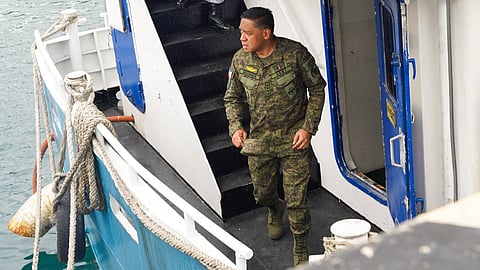
- NEWS
- the EDIT
- COMMENTARY
- BUSINESS
- LIFE
- SHOW
- ACTION
- GLOBAL GOALS
- SNAPS
- DYARYO TIRADA
- MORE

The Armed Forces of the Philippines (AFP) on Tuesday confirmed that Chinese vessels have been challenging Filipino fishermen to leave the West Philippine Sea (WPS).
In an ambush interview in Camp Aguinaldo, Philippine Navy Rear Admiral Roy Vincent Trinidad said the radio challenges against Philippine vessels “are a normal occurrence.”
“But also on our side, we keep performing our mandate. We keep challenging all ships, not only the PLA (People’s Liberation Army) Navy or Chinese Coast Guard,” he explained.
“On a monthly basis, we monitor more than 12,000 ships. We issue the proper challenges. Some of them reply,” he noted.
Trinidad explained that the AFP’s presence in the WPS, along with other agencies, is in line with protecting the country’s sovereignty and the rights of Filipino fishermen.
The AFP, the Philippine Coast Guard (PCG) and the Bureau of Fisheries and Aquatic Resources (BFAR) are jointly or individually maintaining presence in the WPS, which overlaps South China Sea (SCS).
China claims nearly the whole SCS, but a 2016 arbitral ruling declared its assertion as baseless, while recognizing the Philippines’ exclusive economic zone in the WPS.
“The approach of the AFP is to monitor developments in the West Philippine Sea. The moment we get reports, we either bring this into the AFP reporting system, or if it concerns other government agencies, we pass them off to the appropriate agency,” he said.
Actionable calls
Trinidad stressed that the military has capabilities to monitor all sources of information in the WPS.
“The moment we get specific actionable information for the AFP, then we have the corresponding response mechanism. If it falls under the purview of other government agencies, we give it to them outright, immediately,” he said.
Asked if Filipino fishermen can still fish in the key occupied features of the WPS, Trinidad replied: “Yes. However, details of that — a more accurate picture — could be given by the BFAR and the Coast Guard.”
Since September last year, the military has been urging fishermen to avail of the country’s rich resources in the WPS to help assert the Philippines’ sovereign rights in its exclusive economic zone (EEZ).
In June this year, several fishers’ groups called on the Philippine government to strengthen the country’s maritime security, particularly in the waters off Western Mindanao, where Chinese warships were reportedly sighted.
Despite the Chinese presence, AFP Chief General Romeo Brawner Jr. assured Filipino fishermen they could continue fishing in their traditional grounds in the WPS.
“That’s our message. We told them not to be afraid, but to just go ahead with their normal activities and fish in our exclusive economic zone. We have the right to exploit the resources in the area. So our fishermen should not be afraid,” Brawner said in a previous interview.
Trinidad reiterated the military’s call for Filipino fishermen to continue fishing in the WPS.
“We would like to inform all our fishermen, our fisherfolk, our fellow countrymen: magpatuloy po tayo pumalaot (to continue fishing) and to do your normal day-to-day activities of fishing sapagkat ang mga karagatan na ito ay sa atin, tayo ang dapat makinabang sa ating yamang dagat (because this ocean belongs to us, we should benefit from the rich sea),” he said.
Unimpeded access
Despite reported Chinese aggressions in the WPS, Trinidad said Filipinos have “unimpeded access all over the expanse” of the area.
“The illegal actions being done to us are not on a daily basis. These are isolated, usually on Bajo de Masinloc. Sometimes, we would monitor other areas, but overall, it is peaceful,” he said.
He noted that government agencies are also performing their respective functions in the country’s maritime domain.
“There are different instruments of national power at work in the maritime domain. They have their own mandates,” Trinidad said when asked if the Philippine Navy would have to go toe-to-toe with its Chinese counterparts.
